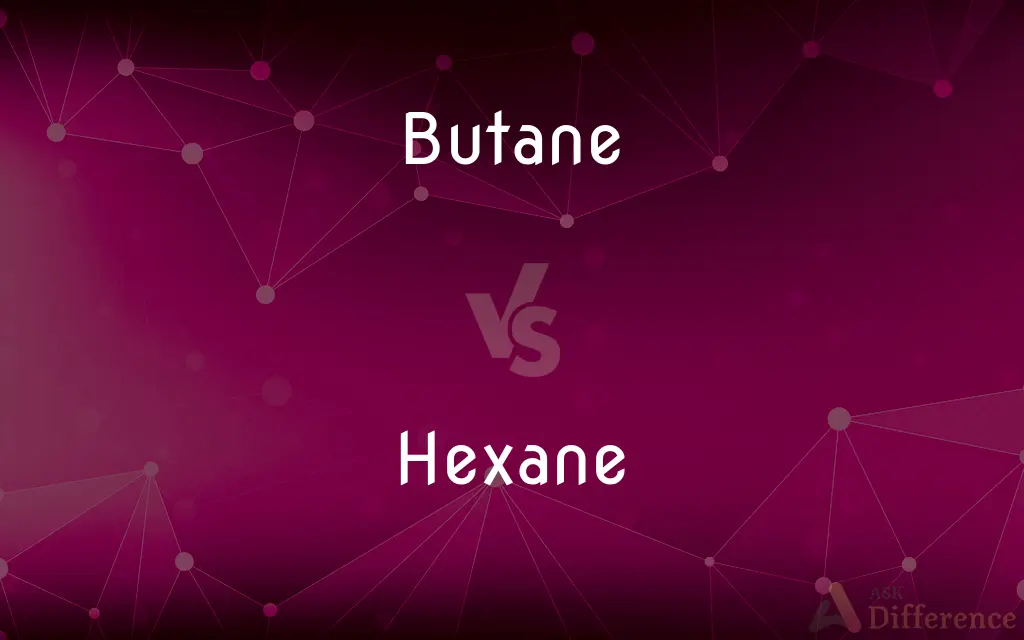Butane vs. Hexane — What's the Difference?
By Tayyaba Rehman & Urooj Arif — Updated on April 23, 2024
Butane is a lighter hydrocarbon with four carbon atoms, used mainly as fuel, while hexane has six carbon atoms, used largely in solvent applications.

Difference Between Butane and Hexane
Table of Contents
ADVERTISEMENT
Key Differences
Butane, a saturated hydrocarbon, consists of four carbon atoms (C4H10) and is commonly used in lighters and portable stoves. Hexane, on the other hand, contains six carbon atoms (C6H14) and is frequently employed as an industrial solvent, particularly in the extraction of edible oils.
Butane has a lower boiling point of about -0.5 degrees Celsius, which makes it suitable for applications requiring rapid gasification at moderate temperatures. Hexane, whereas, boils at approximately 69 degrees Celsius, indicating its stability and suitability for applications involving higher temperatures.
Butane is less complex structurally and as a result, is less heavy and less dense than hexane. Hexane, however, due to its longer carbon chain, is heavier and denser, influencing its physical properties and applications.
Butane is often utilized in consumer products for its ease of liquefaction and portability. Hexane is primarily used in industrial settings, notably in chemical synthesis and as a cleaning agent due to its ability to dissolve oils and fats.
Butane emissions are primarily concerns in terms of air quality and greenhouse gas contributions. Hexane, while also contributing to air pollution, poses additional health risks due to its neurotoxic effects when inhaled over long periods.
ADVERTISEMENT
Comparison Chart
Carbon Atoms
4
6
Boiling Point
-0.5 degrees Celsius
69 degrees Celsius
Main Use
Fuel (lighters, stoves)
Solvent (industrial applications)
Density
Lighter
Heavier
Health Risks
Lower (mainly as pollutant)
Higher (neurotoxic effects)
Compare with Definitions
Butane
A substance used in butane lighters.
The butane lighter needs refilling.
Hexane
A solvent used extensively in industrial applications.
Hexane is crucial for extracting vegetable oils from seeds.
Butane
Known for its fast gasification.
Butane quickly vaporizes which makes it useful in winter sports equipment.
Hexane
A volatile component of gasoline.
Hexane helps improve gasoline's volatility and performance.
Butane
Utilized in the manufacture of synthetic rubber.
Butane is a key ingredient in certain industrial processes.
Hexane
Prone to causing nerve damage upon prolonged exposure.
Workers are advised to use protective gear to avoid hexane exposure.
Butane
A light, gaseous hydrocarbon used as fuel.
Butane is often preferred for portable camping stoves.
Hexane
A component in the formulation of glues and varnishes.
Hexane is effective in dissolving the adhesives used in roof installation.
Butane
A component of liquefied petroleum gas.
Butane canisters are widely used in gas grills.
Hexane
Has a higher boiling point suitable for certain chemical reactions.
Hexane is used in reactions that require a stable, medium-boiling solvent.
Butane
Butane () or n-butane is an alkane with the formula C4H10. Butane is a gas at room temperature and atmospheric pressure.
Hexane
Hexane () is an organic compound, a straight-chain alkane with six carbon atoms and has the molecular formula C6H14. Hexane is a significant constituent of gasoline.
Butane
Either of two isomers of a gaseous hydrocarbon, C4H10, produced synthetically from petroleum and used as a household fuel, refrigerant, and aerosol propellant and in the manufacture of synthetic rubber.
Hexane
A colourless liquid hydrocarbon of the alkane series, present in petroleum spirit.
Butane
(organic compound) A hydrocarbon (either of the two isomers of C4H10 n-butane, and 2-methyl-propane) found in gaseous petroleum fractions.
Hexane
Any of several isomeric colorless flammable liquid hydrocarbons, C6H14, derived from the fractional distillation of petroleum and used as a solvent and as a working fluid in low-temperature thermometers.
Butane
The n-butane isomer only.
Hexane
(organic compound) Any of five isomeric aliphatic hydrocarbons, C6H14. They are colorless, volatile liquids.
Butane
An inflammable gaseous saturated hydrocarbon, C4H10, of the marsh gas, or paraffin, series.
Hexane
Any one of five hydrocarbons, C6H14, of the paraffin series. They are colorless, volatile liquids, and are so called because the molecule has six carbon atoms.
Butane
Occurs in natural gas; used in the manufacture of rubber and fuels
Hexane
A colorless flammable liquid alkane derived from petroleum and used as a solvent
Common Curiosities
How do the physical states of butane and hexane differ at room temperature?
Butane is generally a gas at room temperature, whereas hexane is a liquid.
Can butane be used in hexane's applications as a solvent?
Butane is not typically used as a solvent due to its gaseous state at room temperature and different chemical properties.
What is the chemical formula for butane and hexane?
Butane is C4H10, while hexane is C6H14.
What are the environmental impacts of using hexane compared to butane?
Hexane's use, particularly as a solvent, can contribute to air and water pollution if not managed properly, whereas butane primarily impacts air quality through emissions.
Are butane and hexane found naturally?
Both butane and hexane are found in natural gas and crude oil before being isolated for various uses.
What role does hexane play in food production?
Hexane is extensively used in the extraction of edible oils from seeds and vegetables.
What industries use hexane the most?
The chemical, food processing, and pharmaceutical industries frequently use hexane as a solvent.
How do molecular structures of butane and hexane affect their properties?
The longer chain of hexane provides greater intermolecular forces and a higher boiling point compared to butane's shorter and simpler structure.
How do safety measures differ when handling butane versus hexane?
Butane handling requires precautions mainly against fire and explosion, while hexane also requires measures to prevent inhalation and long-term exposure due to its neurotoxicity.
Why is butane preferred in portable fuel applications?
Its low boiling point and ease of compression into liquid make butane ideal for portable applications.
How are butane and hexane typically stored and transported?
Butane is stored and transported in pressurized containers as a liquefied gas, whereas hexane is transported in tanks as a liquid under normal atmospheric conditions.
Is hexane ever used in consumer products?
Yes, hexane is sometimes used in consumer products such as adhesives, varnishes, and in some cleaning agents.
What are the flash points of butane and hexane?
Butane has a flash point of around -60 degrees Celsius, much lower than hexane's flash point at -22 degrees Celsius, making butane more flammable.
What are the effects of inhaling butane?
Inhaling butane can lead to dizziness, euphoria, asphyxia, narcosis, and in severe cases, sudden sniffing death syndrome.
What precautions are necessary when using butane in high-altitude or cold environments?
While butane is advantageous for its portability, its performance can decrease in cold conditions due to reduced vapor pressure, requiring specialized blends or alternatives for consistent performance.
Share Your Discovery

Previous Comparison
Tillage vs. Tilth
Next Comparison
Swivelling vs. SwivelingAuthor Spotlight
Written by
Tayyaba RehmanTayyaba Rehman is a distinguished writer, currently serving as a primary contributor to askdifference.com. As a researcher in semantics and etymology, Tayyaba's passion for the complexity of languages and their distinctions has found a perfect home on the platform. Tayyaba delves into the intricacies of language, distinguishing between commonly confused words and phrases, thereby providing clarity for readers worldwide.
Co-written by
Urooj ArifUrooj is a skilled content writer at Ask Difference, known for her exceptional ability to simplify complex topics into engaging and informative content. With a passion for research and a flair for clear, concise writing, she consistently delivers articles that resonate with our diverse audience.














































